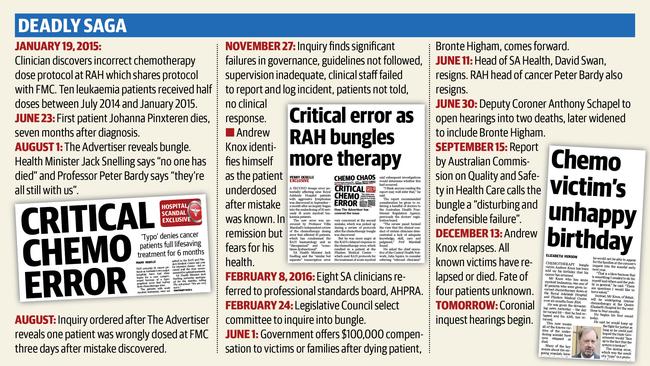SA Government drops threat to block coroner’s right to inquire into deaths of chemo bungle victims
HEALTH Minister Jack Snelling has backed away from a “cruel attempt” to derail this week’s coroner’s inquest into the deaths of three victims of the chemotherapy underdosing scandal.
- Knox told on his birthday his cancer had returned
- Andrew Knox tells his story of the RAH’s chemo blunder and cover-up
- How a ‘typo’ denied cancer patients full treatment
- Brave chemotherapy bungle victim Bronte Higham dies
- Inquest into chemo bungle deaths halted for specialist reports
HEALTH Minister Jack Snelling has backed away from a “cruel attempt” to derail this week’s coroner’s inquest into the deaths of three victims of the chemotherapy underdosing scandal.
For seven months gravely ill chemotherapy victim Andrew Knox and families of the three victims had feared that the Crown Solicitor would challenge the coroner’s right to inquire into their deaths, forcing their legal teams to prepare costly arguments.
However, in a letter to Mr Knox last week, Mr Snelling said there would be no government challenge.
“I confirm the Crown Solicitor’s office, acting for the State Government, has not foreshadowed a challenge to the Coroner’s jurisdiction,” he said.
Mr Snelling declined to elaborate on the contents of the letter.

Mr Knox, who blames the underdose mistake for the relapse that has left him too sick to attend the Coroner’s Court on Tuesday, said they were stunned when the move was signalled last July and he has demanded an apology from Mr Snelling for the hurt and pain it had caused.
“We were gobsmacked and incredibly angry and insulted,” Mr Knox said from his bed in
the Queen Elizabeth Hospital. “It was extraordinarily hurtful.”
He said this clear objection to the coroner’s jurisdiction had not, as far as he knew, been withdrawn.
In July last year, during directions hearings for this week’s inquest into the deaths of Chris McRae, Johanna Pinxteren and Bronte Higham, the Crown Solicitor said the status of the deaths as reportable — and therefore eligible for a coronial inquiry — was “a live issue, an open question” and it was premature to infer their referral to the coroner was correct.
Mr Knox said he was particularly angry because Premier Jay Weatherill last year partly relied on the inquest to reject a request for a full judicial inquiry, saying five reviews were already underway. This included the coroner’s inquest, which it was looking to oppose.
“Then the Government had the temerity to turn around and say we are going to try and block it,” Mr Knox said.
Having led a public fight for the rights of the ten leukaemia patients who were underdosed during chemotherapy treatment at the RAH and FMC between 2014 and early 2015, Mr Knox, 68, now faces the fight of his life.
He blames the half-dose of chemotherapy for a relapse diagnosed on his birthday in December, because the same cell had returned.
“In my case it is proven, because what I have is what I had before,” he said from an infection-controlled restricted ward at the QEH. “It didn’t get killed. If it had been eradicated, it would have come back mutated (in a new form).”
Mr Knox said he would ask his legal team, which the State Government would fund, to question an independent expert called to the inquiry, Professor John Gibson from Royal Prince Alfred Hospital in Sydney, about the link.
“I want to ask Professor Gibson, ‘in the case of each of us, if the cells have not mutated, does that signify they were not properly treated in the first place?’,” he said.
He said another patient who was still alive but had relapsed was told twice by her doctor that her period in remission would have been longer but for the error, which resulted from an incorrect data entry.
“If it compromised her remission, then it was a very small step towards saying it compromised the survival of the other three,” he said.
After two months of intense treatment, Mr Knox is at a critical point in his recovery where he must produce his own blood cells in order to proceed to a donor stem cell transplant sourced from a donor in Europe. During treatment, he has been given the underdosed drug, Cytarabine, at a level more than six times higher than before.
